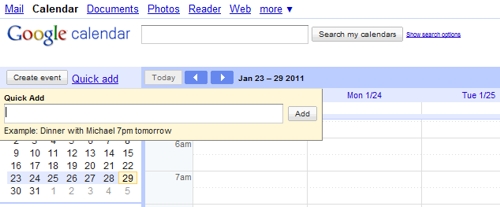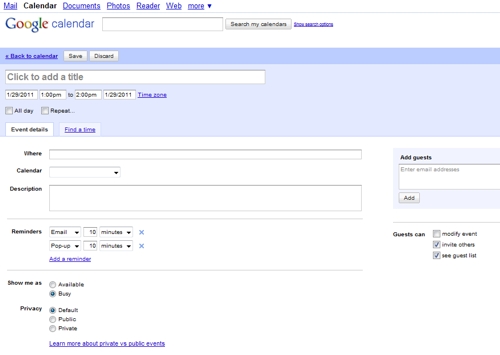Most sites on the web give the user a single thing to accomplish. They're very focused, and they do that single task very well. Take Twitter... you type in your tweet, and you click the "Tweet" button. Or Typepad, for blogging. A bit more information, a bit more complicated... but that's about it. Title, article, a few tags, and maybe an uploaded picture. Now Google, aside from its simplistic (but very robust) search functionality, offers more complicated tools. Calendar is one of their more complicated tools. You can Quick Add an event...  ...or you can choose the full suite of event options.  While the market for those who want to manage a calendar is certainly universal, it's estimated that about 25 million people use Google Apps. Compare that to Twitter's 145 million users. With complexity comes a decrease in audience. How do you take multi-faceted, complex tasks and help the end-user easily manage those tasks? Interface design is hard. Very hard. Nobody likes to read a user manual. Nobody likes to feel stupid. Everyone wants to look and feel smarter and more powerful through the tools that they use. Interface design is probably best defined as the attempt to make everyone happy. For those who get frustrated by the exercise of trying to make everyone happy, it's likely that they will give up quickly. For those who persist, it takes several iterations, many discussions, lots of open listening, and rewrite after rewrite. As I go through the interface of 247 with various people, I'm always seeing how things could improve with simplification and clearer language and presentation. Then the editor in me has to determine what lands on the To-Do list, and what falls on the To-Don't list. Every decision comes with a trade-off that has an impact on the future of the business. I love the process of the decision-making, of balancing the load. It's a skill with no name, really. It's probably akin to day-trading, but with less, um, drama. And then with each change, it goes out into the package and I learn what my customers think. My chief job then is to help them remain honest with me. Most people steer clear of open criticism, but that's exactly what I need - knowing what didn't communicate. That too is a skill with no name, but more essential than just about anything else. |